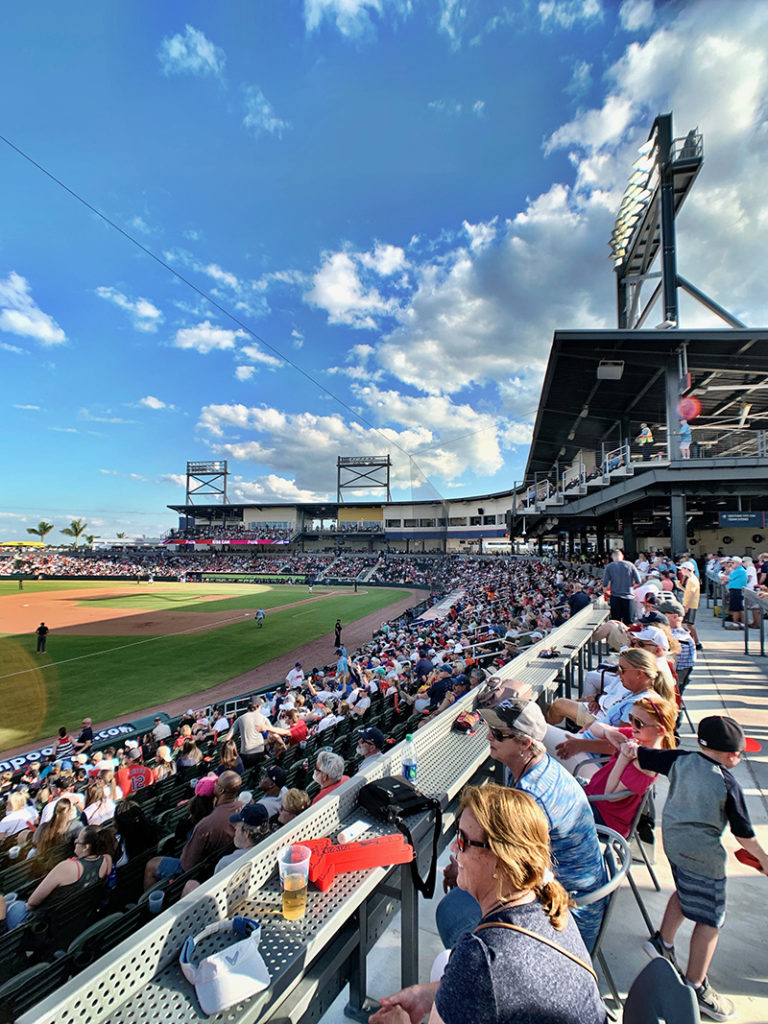
Automated ball-strike (ABS) technology–referred to popularly as robo-umps–will be implemented during spring training 2020 for nine Grapefruit League games on an evaluative basis, but the ABS technology won’t be used for any actual game calls.
MLB Commissioner Rob Manfred had announced the use of ABS technology this coming spring in a Fox Business interview from the Davos World Economic Forum, saying it would be used in spring training games in Florida. No surprise: after testing the technology in the independent Atlantic League and the rookie Arizona Fall League–with some improvement clearly needed–MLB and MiLB had announced that it would be used in a limited basis during the 2020 MiLB season in the High-A Florida State League (specifically, in the FSL ballparks controlled by MLB teams). Manfred extolled the virtues of ABS technology from Davos, saying that it was better at analyzing three-dimensional space than human umps: “We think it’s more accurate than a human being standing there.”
The executive committee of the umpires’ union, not surprisingly, soon followed up with a clarification to ESPN: ABS would be installed and functional this spring for nine games, but it wouldn’t actually make any calls. (So, in other words, you probably won’t notice it.) Human umps would still call balls and strikes, with the ABS tech undergoing further refinement. From the umps: Reports that MLB will use ‘robo-umps’ to call balls and strikes in spring training games this year are completely inaccurate. … Our understanding is that a camera-based tracking system will be running in the background during some spring training games for technology development and training purposes. But any game in which a Major League Baseball umpire is working will have a human calling balls and strikes.”
In addition, the executive committee of the umpires’ union clarified exactly what it expected in terms of the future of ABS technology, coming a month after MLB and the union agreed to a new five-year labor agreement:
The union, according to the statement, “has never opposed the use of technology to improve the accuracy of calls, including on balls and strikes, if it can be done while protecting the integrity of the game. We do not claim to be perfect and we work constantly to improve our performance.
“But no automated system will be perfect either, and we have concerns about potential fundamental changes to pitch-calling that will need to be accepted by both the players and the fans.
“To achieve this new contract with the owners, however, we agreed that MLB can use [the electronic strike zone], if important conditions are met, and after a process through which umpires will have direct input into when and how the technology enters Major League games, including spring training games. We believe our involvement will be crucial to preserving fair play if the owners are determined to introduce this fundamental change.
“We bargained hard for these protections, and the process we negotiated has not even started. Use of … technology in spring training games this year would be premature and would violate our new agreement. We have received absolutely no word from the Office of the Commissioner that MLB intends to do that.”
That the ABS technology needs refinement is no secret: while it handles upper-strike-zone calls well, it is less effective on low pitches and balls in the dirt, and is isn’t yet set up to track check swings. Former MLB pitcher Frank Viola, who has spent recent years as an MiLB pitching coach before signing on in the same role for the Atlantic League’s High Point Rockers, was not enthusiastic about ABS use in the independent circuit in 2019, calling the results “potluck guessing” that penalized both teams. Implementing a new sports referee technology to eliminate the human factor is always tricky: In many situations, it’s been far from perfect.

Comments are closed.